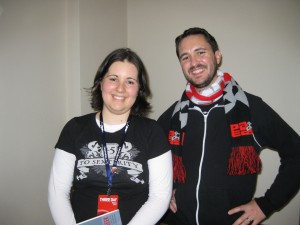Let me tell you about The Sims Medieval
Well, I had every intention of putting together the last of my PAX posts and a Webcomics Wednesday post yesterday. Instead, I played nine hours of The Sims Medieval. That’s ridiculous. It’s a nonsensical amount of time to spend doing anything other than maybe sleeping. The worst part was that I had no concept of the passage of time. It wasn’t until Brian got home from work that I even realized it wasn’t morning anymore.
Before I get into my review of the game so far, I should mention that I already love The Sims. I’ve played since the beginning, and other than the horrible idea they had to put the game on consoles, they’ve been fantastic. I’ll admit, though, that they’ve only held my attention for a short while. As soon as a new game or expansion came out, I would get it. I’d mess around for a while, make my Sims do stuff, and eventually use the cheat code for unlimited money and build the mansion of my dreams. This would hold my attention for a while, but eventually I’d get bored and stop playing. They’ve been the kinds of games that when I found myself with nothing else to do, I’d go back to them for a little while (of course World of Warcraft pretty much guarantees that I always have something to do), but they haven’t had the hold that some other “unending” games have had.
This game is different.
When you start up Medieval, the opening movie features really cool animation featuring voice over by Patrick Stewart. That’s right. Now not only do I want to take good care of my Sims, Patrick Stewart also wants me to take good care of my Sims. One of the major difference between this game and all that came before it is that you (yes, you) are a part of the story. Instead of being this nameless faceless controller who makes your Sims sleep with each other, you are the Watcher. It definitely has a sort of Black and White feel about it. The idea is that now it is time for you to become more than just a Watcher. You are going to take an active roll in the formation of this Sim society.
One of the biggest problems people have with The Sims games is that there are no goals. They tried to remedy this with the Ambitions mechanic, but you never really got anything for achieving those goals. An even larger problem was that there was never any negative impact to not achieving them.
Right off the bat, you have to choose a goal for your entire kingdom. I’m still working on just the “Getting Started” goal, but there are different goals based around getting the most money, promoting religion, scientific advancement, etc. Once you’ve chosen your goal and named your kingdom, you create your monarch.
For this game, they’ve provided more ways to alter the physical appearance of your Sims, but fewer ways to alter their clothing. All clothing comes as outfits, which you can change the colors of, but no mix and match pieces like previous games. Faces are almost infinitely editable, with both a simple interface or a more advanced. You also have the option of using prebuilt Sims or using random rolling to create them.
Each Sim has two traits and one fatal flaw. These influence different abilities your Sim has (one of my Sims can give comforting hugs) and debuffs that you can pick up (my apothecary has the “licentious” fatal flaw, so if she doesn’t get some tender loving on a regular basis, she gets a debuff to her focus).
Once you’ve chosen your kingdom goal and created your first hero, you choose quests. These quests give you points when finished that allow you to build more buildings in town and hire more “heroes”. These buildings have standard locations and standard layouts which you cannot alter. You can, however, upgrade furnishings, walls, and floors. If two Sims from different buildings get married, you choose where they will live.
In addition to reward points for buildings, each quest also grants points to your overall kingdoms stats. These stats include well being, security, culture, and knowledge. Therefore, if your kingdom’s goal is to be the cultural hub of simulated Medieval times, you can choose quests that will grant you more culture points and ignore the others. It’s a really fantastic way to keep the same fun of controlling what these characters do while providing a goal oriented framework that is engaging.
After finishing the first quest with my monarch, Lord Fitzherbert the Great (yeah, that’s right), I built a clinic and hired an apothecary to work there. This opens up new quests and new options for how I want to complete these quests. Some quests are designed for one particular hero, but others let you choose who your primary (and occasionally secondary) hero will be and how they will go about completing the quest. The bard is going to have a different set of objectives in a quest than a blacksmith will have.
In the previous Sims games, you’ve been in charge of every aspect of your Sims life. You monitor their fun, their energy, and if they have to go to the bathroom. In early versions, you had to tell them everything to do. Later on, they got a little smarter and would take care of themselves if left to their own devices. Here, most of the nitpicking details you used to have to monitor have been rolled into something called Focus. The higher your focus is, the more likely your Sim is going to succeed at various tasks (such as harvesting materials or crafting items.) The only two stats you have to manage are hunger and energy. Have them eat when they’re hunger and sleep when they’re tired. Pretty simple.
In previous games, your characters would find a job in the paper, get hired, and go off for several hours a day; all your Medieval heroes already have jobs. As a result, every morning at 9 you are given two objectives for the day. If you complete them in the allotted time, you get a buff to your focus. If you fall down on the job, you get a debuff. My apothecary works at the clinic and usually has to create tonics for people or diagnose their illnesses. My blacksmith has to make or mend weapons. My bard has to gather inspiration and write poems. All the quests I’ve done so far only use one or two heroes, so there isn’t too much to manage. On a side note, gathering ore for the blacksmith is a pain in the neck, but the actual blacksmithing is really fun.
Controlling multiple characters for a quest can get a bit tricky when they both have multiple quest objectives in addition to their daily career requirements. They live and work in different buildings which results in a lot of back and forth. They’ve done a good job of giving you plenty of control in the UI to jump around to where you need to be. Also, if there is another character that your hero must interact with, they get a little marker on your screen indicating their location that you can click to gain access to all the interaction options without having to actually find where they are.
If you ignore your quests for too long, things start to go bad. After a certain amount of Sim time without completing any quest objectives, you get a debuff. At first there’s no real impact, but eventually your Sim can be put in the stocks for shirking their duty to the kingdom. Happened to me. It was sad. My Sim was very unhappy. Once you get out of the stocks, you can jump right back into your questing, though overcoming the focus debuffs for the public humiliation can be a bit tough.
You can only have one active at a time. You can abandon quests in order to pick up a different one, but in my experience you can’t really fail at a quest. You can, however, succeed less, but the end result is still the same. Points for your kingdom and XP for your hero.
If you hate The Sims, this game probably isn’t different enough for you to get over that. If you just kind of liked The Sims but missed having goals, this game might have enough meat on its bones to satisfy you. I could go on for days about how much I’m enjoying this game and detailing all the adventures my various heroes have been having. My only real problem with this game is how much time it takes up without me noticing. So, if you don’t hear from me, you’ll know where I am.









